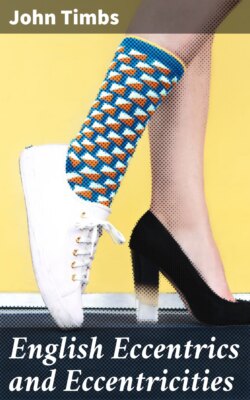Читать книгу English Eccentrics and Eccentricities - John Timbs - Страница 38
На сайте Литреса книга снята с продажи.
"Dog Jennings."
ОглавлениеTable of Contents
This eccentric character, Henry Constantine Jennings, was born in 1731, and was the son of a gentleman possessed of a large estate at Shiplake, in Oxfordshire. He was educated at Westminster School, and at the age of seventeen years became an ensign in the 1st Regiment of Foot Guards. He held the commission but a short time, and on resigning it went to Italy in company with Lord Monthermer, son of the Duke of Montagu.
While at Rome, young Jennings commenced his first collection of articles of vertu, and ever after obtained the coarse and vulgar sobriquet of "Dog Jennings," in consequence of a circumstance which he thus relates:—"I happened one day to be strolling along the streets of Rome, and perceiving the shop of a statuary in an obscure street, I entered it, and began to look around for any curious production of art. I at length perceived something uncommon, at least; but, being partly concealed behind a heap of rubbish, I could not contemplate it with any degree of accuracy. After all impediments had been at length removed, the marble statue I had been poking for was dragged into open day; it proved to be a huge, but fine dog—and a fine dog it was, and a lucky dog was I to discover and to purchase it. On turning it round, I perceived it was without a tail—this gave me a hint. I also saw that the limbs were finely proportioned; that the figure was noble; that the sculpture, in short, was worthy of the best age of Athens; and that it must be of the age of Alcibiades, whose favourite dog it certainly was. I struck a bargain instantly on the spot for 400 scudi; and as the muzzle alone was somewhat damaged, I paid the artist a trifle more for repairing it. It was carefully packed, and being sent to England after me, by the time it reached my house in Oxfordshire, it had just cost me 80l. I wish all my other bargains had been like it, for it was exceedingly admired, as I well knew it must be, by the connoisseurs, by more than one of whom I was bid 1,000l. for my purchase. In truth, by a person sent, I believe, from Blenheim, I was offered 1,400l. But I would not part with my dog; I had bought it for myself, and I liked to contemplate his fine proportions and admire him at my leisure, for he was doubly dear to me, as being my own property and my own selection."
At the Literary Club, one evening, Jennings' dog was the topic of discussion: "F. (Lord Cipper O'Geary.) 'I have been looking at this famous marble dog of Mr. Jennings', valued at 1,000 guineas, said to be Alcibiades' dog.'—Johnson. 'His tail, then, must be docked. That was the mark of Alcibiades' dog.'—E. (Burke.) 'A thousand guineas! the representation of no animal whatever is worth so much. At this rate, a dead dog would, indeed, be better than a living lion.'—J. 'Sir, it is not the worth of the thing, but of the skill in forming it, which is so highly estimated. Everything that enlarges the sphere of human powers, that shows man he can do what he thought he could not do, is valuable.'"
But Mr. Jennings, like many other collectors, owing to a reverse of fortune, was compelled, in 1778, to break up his collection, which being sold by auction, the dog of Alcibiades brought 1,000 guineas, and became the property of Mr. Duncombe, M.P. It is now at Duncombe Park, in Yorkshire, the seat of Lord Feversham.
It is painful to read that the latter days of Mr. Jennings were spent in the King's Bench; and within the rules of that prison he died, February 17th, 1819, at his lodgings in Belvedere Place, St. George's Fields, in his eighty-eighth year.
